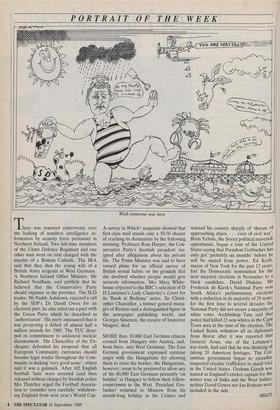PORTRAIT OF THE WEEK
,sn someone was flere here was renewed controversy over
T
the leaking of sensitive intelligence in- formation by security force personnel in Northern Ireland. Two full-time members of the Ulster Defence Regiment and one other man went on trial charged with the murder of a Roman Catholic. The IRA said that they shot the young wife of a British Army sergeant in West Germany. A Northern Ireland Office Minister, Mr Richard Needham, said publicly that he believed that the Conservative Party should organise in the province. The SLD leader, Mr Paddy Ashdown, rejected a call by the SDP's Dr David Owen for an electoral pact; he also ruled out a pact with the Green Party which he described as 'authoritarian'. His party announced that it was projecting a deficit of almost half a million pounds for 1989. The TUC drop- ped its commitment to unilateral nuclear disarmament. The Chancellor of the Ex- chequer defended his proposal that all European Community currencies should become legal tender throughout the Com- munity as making `very good sense'; others said it was a gimmick. After 102 English football 'fans' were arrested (and then released without charge) by Swedish police Mrs Thatcher urged the Football Associa- tion to 'consider very carefully' withdraw- ing England from next year's World Cup. A survey in Which? magazine showed that first-class mail stands only a 50-50 chance of reaching its destination by the following morning. Professor Ross Harper, the Con- servative Party's Scottish president res- igned after allegations about his private life. The Prime Minister was said to have vetoed plans for an official survey of British sexual habits on the grounds that she doubted whether people would give accurate information. Mrs Mary White- house objected to the BBC's selection of D H Lawrence's Lady Chatterley's Lover for its 'Book at Bedtime' series. Sir Christ- opher Chancellor, a former general mana- ger of Reuters and a distinguished figure in the newspaper publishing world, and Georges Simenon, the creator of Inspector Maigret, died.
MORE than 10,000 East German citizens crossed from Hungary into Austria, and, from there, into West Germany. The East German government expressed extreme anger with the Hungarians for allowing them to cross the border; the Hungarians, however, seem to be prepared to allow any of the 60,000 East Germans presently `on holiday' in Hungary to follow their fellow- countrymen to the West. President Gor- bachev returned to Moscow from his month-long holiday in the Crimea and warned his country sharply of 'threats of approaching chaos . . . even of civil war'. Boris Yeltsin, the Soviet political maverick opportunist, began a tour of the United States saying that President Gorbachev has only got 'probably six months' before he will be ousted from power. Ed Koch, mayor of New York for the past 12 years, lost the Democratic nomination for the next mayoral elections in November to a black candidate, David Dinkins. Mr Frederick de Klerk's National Party won South Africa's parliamentary elections with a reduction in its majority of 29 seats; for the first time in several decades the National Party did not secure a majority of white votes. Archbishop Tutu said that police had killed 23 non-whites in the Cape Town area at the time of the election. The United States withdrew all its diplomats from Beirut after it was reported that General Aoun, one of the Lebanon's war-lords, had said that he was thinking of taking 20 American hostages. The Col- ombian government began to extradite suspected cocaine traffickers to stand trial in the United States. Graham Gooch was named as England's cricket captain for the winter tour of India and the West Indies; neither David Gower nor Ian Botham were included in the side.
MSLIT


































































 Previous page
Previous page